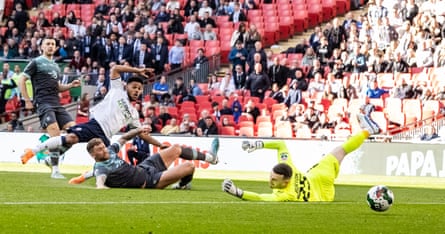Whether it is Auto Windscreens, LDV Vans, Johnstone’s Paint, Checkatrade, Papa John’s or even, post-apostrophe-removing-rebrand, Papa Johns, it seems the EFL Trophy sponsors are often more memorable than the competition itself. The early matches pass without notice as Premier League under-21 sides face League Two journeymen in forgettable Tuesday night matches in autumn.
For many who support the bigger clubs in League One it can be seen as an insult to be in the EFL Trophy when they drop down from the Championship, while fourth-tier clubs fear it could be a distraction from a promotion push. The competition has two main selling points for lower-league clubs: it is generally profitable and offers a rare chance to reach Wembley.
Last year’s winners, Bolton, took 34,000 supporters to the capital for their victory over Plymouth but for their opening fixture with Salford this season 2,938 turned up at the Toughsheet Community Stadium. It is a sign that the momentum grows with the competition once the group matches, which continue on Tuesday, are out of the way.
Clubs like it because the prize money, in addition to a £20,000 participation fee, brings £10,000 per victory and £5,000 per draw in the group stage, with the figures for a win rising through the rounds to £100,000 for winning the final. Bradford City see the benefits of the competition. “We struggle in the early rounds but the crowds have been higher in recent years,” their chief executive, Ryan Sparks, says. “We have been clear that we will name better teams and take the competition seriously but they are still low four figures.
“I would assume if we got through to the knockout rounds that would increase and if the under-21 sides take us to their home grounds in the latter rounds it would be in the Premier League stadiums – that would bring more interest. I do not think we would have a problem taking 30,000-plus to Wembley if we made the final.”

Lower-league players have a mixed view of the competition because many clubs either offer no bonuses or half of their league rate for appearances, goals and wins. For those not in the normal first XI, though, the potential for a rare start is gladly taken.
For the eventual finalists, the rewards are numerous. In 2019, Portsmouth v Sunderland achieved a record attendance of 85,021. The two clubs were relatively recently in the Premier League and it shows the allure of a trip to Wembley, regardless of the competition. “If you have made the final or area finals, there is TV money from Sky, there are increased retail sales, commercial activity and you are potentially growing your fanbase, as you may attract new people or some that have not been for a long time,” Sparks says. “There is a bigger picture if you can get all the way through the competition.”
In addition to the carrot of Wembley and everything in between, there is another key objective for the EFL Trophy: to give Premier League academy players the chance to face experienced professionals. Manchester City, Manchester United, Liverpool, Arsenal and Chelsea are some of the clubs that see merit in the opportunity for their youngsters to test themselves.
Brian Barry-Murphy has seen the competition from numerous vantage points. He was a veteran when under-21 teams were allowed in and went on to manage Rochdale before taking up his current position as Manchester City’s under-21 head coach. “I always reference to our players that the feeling when I was playing and managing was about the fear of being a senior pro and facing players who are 16, 17 and feeling like you were going to be embarrassed by them,” Barry-Murphy says.
after newsletter promotion
A number of City players who represented the club in the competition last season have gone on to play in the Football League. Shea Charles, for example, moved to Southampton and Joshua Wilson-Esbrand spent time on loan at Coventry. Oscar Bobb, meanwhile, is part of Pep Guardiola’s squad. “The EFL Trophy is a guide for where our players are at,” Barry-Murphy says. “We always wanted to take a guide from the Uefa Youth League to see how they compare age for age against the best in Europe but the league managers don’t care about that because they want to see how they cope against senior pros and men, so it has probably become the most important sample of how the players cope before their next move.”
It is an interesting period for City’s youngsters, many facing the triple challenge of Premier League 2, Uefa Youth League and coming up against experienced lower-league players in quick succession to test every aspect of their game. “It is a brilliant competition and one that we were a little slow to see how beneficial it was to us because you could get the feeling from the league clubs of: ‘Is it that good?’” Barry-Murphy says. “But I think it is because the level of development you can see in it is so beneficial and so quick, which you wouldn’t get with training games.”
The Premier League wants its under-21 teams to play more matches in the competition to indicate how important their clubs have found it for young players. It may be a forgotten tournament for fans until the later rounds but it is here to stay to help the English game.
